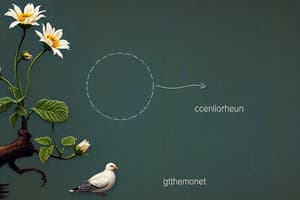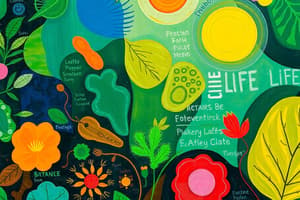Podcast
Questions and Answers
What is biology?
What is biology?
The science that studies living organisms.
What defines an organism?
What defines an organism?
Anything that possesses all the characteristics of life.
What does organization refer to in living things?
What does organization refer to in living things?
Orderly structure shown by living things.
What is development in biology?
What is development in biology?
What is growth in the context of living organisms?
What is growth in the context of living organisms?
What is reproduction?
What is reproduction?
What does response mean in biology?
What does response mean in biology?
What is a species?
What is a species?
What is a stimulus?
What is a stimulus?
What is adaptation?
What is adaptation?
What does homeostasis refer to?
What does homeostasis refer to?
What is science?
What is science?
What is a law in scientific terms?
What is a law in scientific terms?
What is a theory in science?
What is a theory in science?
What is peer review?
What is peer review?
What are ethics in a scientific context?
What are ethics in a scientific context?
What is inference?
What is inference?
What is observation?
What is observation?
What is the scientific method?
What is the scientific method?
What is an experiment?
What is an experiment?
What is a hypothesis?
What is a hypothesis?
What is a constant in an experiment?
What is a constant in an experiment?
What is a control group?
What is a control group?
What is data in scientific research?
What is data in scientific research?
What is a dependent variable?
What is a dependent variable?
What is an independent variable?
What is an independent variable?
What is an experimental group?
What is an experimental group?
What is the metric system?
What is the metric system?
What does SI stand for in terms of measurements?
What does SI stand for in terms of measurements?
Flashcards are hidden until you start studying
Study Notes
Key Concepts in Biology
- Biology: The scientific study of living organisms, focusing on their structure, function, growth, and interactions.
- Organism: Any entity that exhibits all characteristics of life, such as organization, reproduction, and response to environmental changes.
Fundamental Characteristics of Life
- Organization: Living things exhibit an orderly structure, which is essential for functioning.
- Development: The process through which organisms change and become more complex over their lifetimes.
- Growth: Refers to a quantitative increase in living material and the formation of new structures.
Reproductive and Adaptive Processes
- Reproduction: The biological process through which organisms produce offspring, ensuring species survival.
- Response: The ability of an organism to react to stimuli from its environment, demonstrating sensitivity and adaptability.
- Adaptation: Inherited traits that enhance an organism's ability to thrive in specific environments.
Homeostasis and Internal Regulation
- Homeostasis: The mechanisms that maintain a stable internal environment essential for life processes, such as temperature and pH balance.
Scientific Framework
- Science: An organized method of investigating natural phenomena using evidence, leading to a systematic body of knowledge.
- Law: A well-substantiated description of observed phenomena that has been repeatedly tested and widely accepted.
- Theory: A robust explanation developed through extensive testing and validation of many observations.
Research and Methodology
- Peer Review: A scrutiny process where other scientists evaluate an experiment's procedures and results to ensure reliability.
- Scientific Method: A structured approach to problem-solving encompassing observation, hypothesis formulation, testing, and conclusion.
Data and Measurement
- Observation: The systematic gathering of direct information about natural occurrences.
- Data: Collected information that arises from observations, used for analysis during experiments.
Experimental Design Elements
- Hypothesis: A testable prediction that can be supported or refuted through experimentation.
- Variables: Factors in an experiment include:
- Independent Variable: The factor manipulated to observe its effect.
- Dependent Variable: The factor that is measured, expected to change in response to the independent variable.
- Constants: Variables that are kept unchanged throughout an experiment for validity.
Experiment Group Types
- Control Group: The baseline group that does not receive the experimental treatment.
- Experimental Group: The group subjected to the treatment of the independent variable to observe effects.
Measurement Systems
- Metric System: A decimal-based system of measurement that simplifies unit conversion.
- SI (International System of Units): The globally accepted measurement system used in scientific research, facilitating standardization across disciplines.
Studying That Suits You
Use AI to generate personalized quizzes and flashcards to suit your learning preferences.




